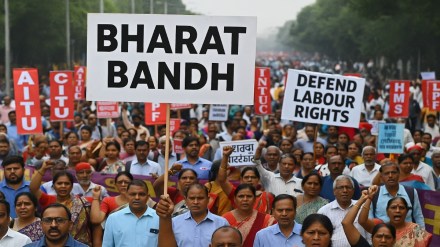Bharat Bandh tomorrow: Over 25 crore workers across India are expected to participate in a nationwide general strike, or Bharat Bandh, on Wednesday. The strike, called by a coalition of 10 central trade unions, aims to protest the central government’s “anti-worker, anti-farmer, and pro-corporate policies.”
Widespread disruption expected
The strike is likely to disrupt key sectors including banking, insurance, postal services, coal mining, transport, and public sector industries. “Banking, postal, coal mining, factories, and state transport services will be affected,” said Harbhajan Singh Sidhu of the Hind Mazdoor Sabha.
Unions such as AITUC, CITU, HMS, INTUC, SEWA, and others have been mobilising for months. “More than 25 crore workers are expected to take part. Farmers and rural workers will also join,” said Amarjeet Kaur of AITUC.
What’s open and what’s closed
Over 25 crore workers across India are participating in the Bharat Bandh called by 10 central trade unions protesting against government policies perceived as anti-worker and anti-farmer. Key sectors affected include:
Closed or disrupted
Banking and insurance services
Postal services
Coal mining and factories
Transport system
Educational institutions (many schools and colleges)
Public sector enterprises
Likely open or partially operational:
Essential services such as railways, markets and shops are exempted from Bharat Bandh. Also, emergency and healthcare services will be open tomorrow.
Farmers and rural workers are also joining protests, intensifying the nationwide impact. The strike is expected to severely disrupt public services and daily life in many areas.
What are the workers demanding?
At the heart of the agitation is a 17-point demand charter submitted to Labour Minister Mansukh Mandaviya last year. The unions say the government has ignored their concerns and failed to hold the annual labour conference for over a decade.
Among the key grievances:
- Implementation of the four new labour codes, which unions claim undermine workers’ rights.
- Increased working hours and weakened union protections.
- Rampant contractualisation and outsourcing in public services.
- Lack of new recruitments and inadequate wage reforms.
- Excessive support for corporations over workers and farmers.
“The government has abandoned the welfare state and is serving corporate interests,” said a joint statement from the unions.
Support from farmers and rural workers
The Samyukta Kisan Morcha and several agricultural workers’ unions have announced their support for the strike. They plan to hold rallies and protests in rural areas to highlight economic distress, unemployment, and rising living costs.
This is not the first time such action is being taken. Nationwide strikes were previously held on: November 26, 2020, March 28–29, 2022 and February 16, 2023.
